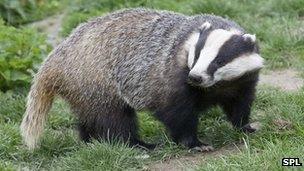Court battle on badger cull fails
- Published

The government says cattle tuberculosis costs the UK more than £100m per year
The Badger Trust has lost its Court of Appeal challenge to government proposals to kill thousands of wild badgers in England.
It clears the way for the start of culls in parts of Gloucestershire and Somerset.
If official licences are issued as planned by Natural England, the pilots could begin within weeks.
The government says action is needed to help combat cattle TB, which costs the UK more than £100m per year.
The Badger Trust challenged a judicial decision in July to uphold government proposals for the pilot culls.
It argued killing badgers would make no meaningful contribution to tackling TB in cattle, and claimed the scheme could lead to thousands of badgers being "pointlessly killed" over the next four years.
The appeal was rejected unanimously.
Speaking after the decision, Jeff Hayden of the Badger Trust told BBC News: "We're pleased that the judge has clarified the law but we are disappointed with the verdict.
"It hasn't changed the scientific facts at all. The majority of independent scientific opinion says the cull is unlikely to work and most probably will make matters worse."
The Badger Trust said it did not know what the next step was, but it would not give up.
At a rally in Bristol against the cull, organised by animal welfare groups, the musician Brian May said the fight would continue.
"It's a terrible tragedy if it goes ahead and it's an irreversible tragedy - you can never bring those badgers back."
The government argues that bovine TB is taking a terrible toll on farmers and rural communities, and action is needed now.
Scientific controversy
A Defra spokesperson said: "Nobody wants to cull badgers. But no country in the world where wildlife carries TB has eradicated the disease in cattle without tackling it in wildlife too."
If what Defra calls "controlled shooting" of badgers is to take place this year, the six-week cull must begin in the autumn, before the badger breeding season begins.
Culling is not permitted when there is a risk that badgers feeding their young might be killed, leaving their cubs underground without food.
In England, two companies have been set up by farmers to manage the cull, using trained marksmen to shoot badgers at night on farm land in the two pilot areas, each the size of the Isle of Wight.
Licences allowing the cull are expected to be issued shortly by the government agency, Natural England.
The exact scope of the pilot areas is not being revealed to the public for fear of reprisals against individuals or their property.
Vaccination hope
The proposed killing of wild badgers is a controversial issue. A proportion of wild badgers - studies in the pilot zones have put the figure at 16% - can become infected with the bacteria that cause bovine TB, and pass the infection on to cattle.
However, scientific studies have shown that culling would be of little help in reducing the disease and even suggest that it could make things worse in some areas.
Plans to begin culling in Wales were recently abandoned in favour of a vaccination policy. There are no proposals to cull badgers in Scotland, where TB incidence is low.
- Published12 July 2012
- Published12 July 2012
- Published25 June 2012